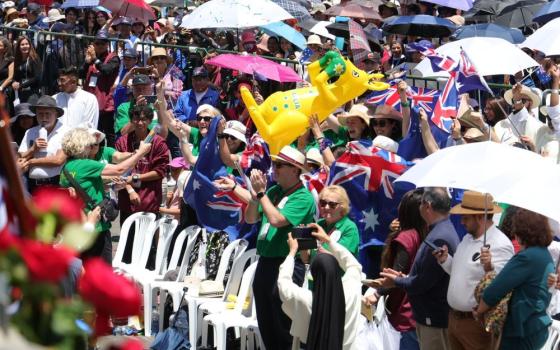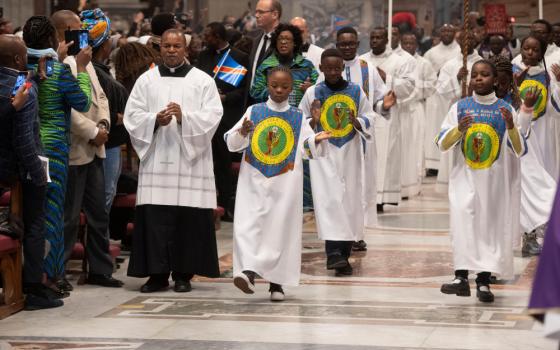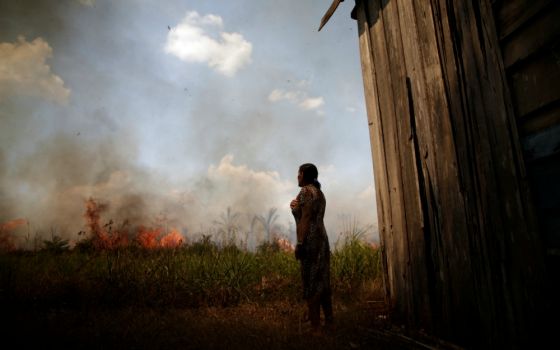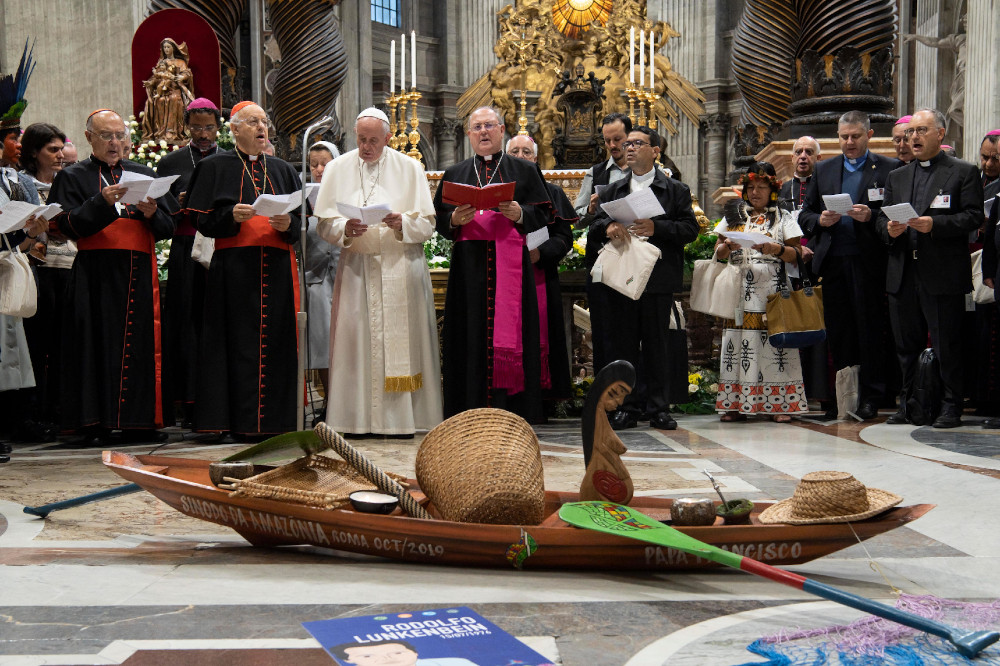
Pope Francis attends a prayer service at the start of the first session Synod of Bishops for the Amazon at the Vatican in this Oct. 7, 2019, file photo. Among those pictured are Cardinal Pedro Barreto Jimeno of Huancayo, Peru; Cardinal Lorenzo Baldisseri, secretary-general of the Synod of Bishops; Bishop Fabio Fabene, undersecretary of the Synod of Bishops; and Father Antonio Spadaro, editor of La Civilta Cattolica. (CNS/Vatican Media)
Pope Francis has not granted a request from the Catholic bishops of the Amazon to allow for the priestly ordination of married men in their territories in order to address a severe lack of ministers across the nine-nation region.
In a hotly anticipated document responding to last October's Synod of Bishops, released Feb. 12, the pontiff acknowledges the difficulty some Catholics in the region face in accessing the Eucharist. But the pope does not specifically respond to the request, made by more than two-thirds of the synod's 185 voting members.
Francis also does not mention the gatherings' conversations regarding the history of women serving as deacons in the early centuries of the church, which the synod's final text had said was "very present" in its discussions.
The new document, an apostolic exhortation with the title Querida Amazonia ("Beloved Amazon"), instead focuses primarily on calling the church across the region to continue its struggle against the unrestrained development taking place in one of the world's most biodiverse areas.
In stark terms, the pontiff denounces the international mineral extraction and lumber industries, saying their quest for profit, which has led to dangerous levels of deforestation, water pollution, and the forced migration of indigenous peoples, resembles a campaign of "injustice and crime."
Francis' text, dated Feb. 2, unfolds over four chapters and 111 numbered paragraphs. The pontiff addresses issues relating to the life of the church in the region in the text's final chapter.
The pope does not specifically mention the synod's request — made in its final document, approved and released Oct. 26 — that he allow bishops in the region to ordain current married deacons as priests.
Instead, after noting that some in the region go without celebrating the Mass for long periods of time, Francis says that "a way must be found" to change the situation. He cites the Second Vatican Council's decree on priestly ministry, which stated that "no Christian community is built up which does not grow from and hinge on the celebration of the most holy Eucharist."
"If we are truly convinced that this is the case, then every effort should be made to ensure that the Amazonian peoples do not lack this food of new life," writes the pontiff.
"This urgent need leads me to urge all bishops, especially those in Latin America, not only to promote prayer for priestly vocations, but also to be more generous in encouraging those who display a missionary vocation to opt for the Amazon region," he states.
The synod bishops had made their request for Francis to allow for the ordination of married priests in their region in one of the 120 paragraphs of their final document. That paragraph was passed by the gathering by a vote of 128-41.
The question of how Francis would answer the request had been the focus of intense speculation in recent weeks. Critics in more conservative Catholic circles claimed that should the pontiff allow for the ordination of married clergy in one region of the world, it would shortly spread to other regions.
The subject received an unprecedented level of scrutiny in January, with surprise news that retired Pope Benedict XVI had coauthored a book with Cardinal Robert Sarah, head of the Vatican's worship office, to defend the church's practice of clerical celibacy.
Archbishop Georg Gänswein, Benedict's private secretary, later said that the ex-pontiff, who is 92-years-old and in frail health, had only meant to offer an essay in the volume and not to be a coauthor.
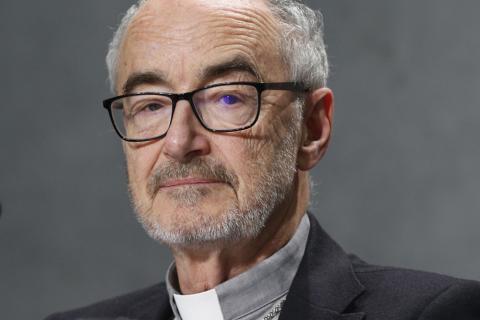
Cardinal Michael Czerny, undersecretary for migrants and refugees at the Vatican Dicastery for Promoting Integral Human Development, is pictured during a news conference for the release of Pope Francis' apostolic exhortation, 'Querida Amazonia' at the Vatican Feb. 12. (CNS/Paul Haring)
Although several well-informed sources told NCR that Francis' document had been substantially finished in late December, well before announcement of Benedict and Sarah's book, the timing of the exhortation's release may lead to speculation that the language of the text was somehow influenced by the book.
In an interview with state-run Vatican News timed for release at the same moment as the exhortation, Cardinal Michael Czerny said the question of how the church can better minister in the Amazon region "is not one of numbers."
"The Amazon challenges us … to overcome limited perspectives and not to content ourselves with solutions that address only part of the situation," said Czerny, one of the synod's main organizers. "The great question is a renewed experience of faith and evangelization."
'A very narrow aim'
Francis opens his exhortation by saying he does not wish for the text to replace the synod's own final document, but rather to provide "a synthesis of some of the larger concerns" he has expressed in earlier documents and throughout the synod process.
"I would like to officially present the final document … which profited from the participation of many people who know better than myself or the Roman Curia the problems and issues of the Amazon region, since they live there, they experience its suffering and they love it passionately," the pope explains.
"I have preferred not to cite the final document in this exhortation, because I would encourage everyone to read it in full," he writes.
At a Vatican press conference presenting the document later Feb. 12, Czerny said Francis' choice to so present the synod's final document gives it "a certain moral authority."
Proposals made by the synod document that were not addressed by Francis in his exhortation, the cardinal said, "remain on the table as proposals made by the synod, which [the pope] encourages the church in the Amazon … to read and to appreciate, and to benefit from."
Pressed on the pope's choice not to reference the synod's call for the approval of married clergy, Czerny responded: "I think the best way to understand this is as part of a process, and as part of a journey."
"We are at a very important point in this synodal process," he said. "And there are long roads ahead as well as those traveled."
The four chapters of the exhortation each address four separate dimensions of life in the Amazon: in terms of social, cultural, ecological, and then ecclesial aspects. The pontiff addresses each aspect in terms of particular dreams he says the region has inspired in him personally.
The text, which is at times quite lyrical, incorporates citations from more than a dozen writers and poets from across the region — including Peru's Ana Varela Tafur, Colombia's Juan Carlos Galeano, and Brazil's Yana Lucila Lema and Amarilis Tupiassu.
"The exclusive character received in Holy Orders qualifies the priest alone to preside at the Eucharist. That is his particular, principal and non-delegable function."
— Pope Francis
The document receiving the most citations is Francis' 2015 environmental encyclical Laudato Si', with 26 references. True to his expressed preference, the pontiff does not reference the Amazon synod's final document even once, but does reference its original working document (known as its Instrumentum Laboris) a total of 14 times.
The decision to not reference the Amazon synod's final document stands in contrast to how Francis has responded to the other three synods of his nearly seven-year papacy. Christus Vivit, the pontiff's 2019 exhortation responding to the 2018 Synod on young people, for example, contained 56 references to that synod's final document.
Francis says his dream for the Christian communities in the Amazon is that they might be "capable of generous commitment, incarnate in the Amazon region, and giving the Church new faces with Amazonian features."
In the section specifically addressing the church's priestly ministry in the Amazon region, which comes towards the end of the fourth chapter, Francis reiterates that only an ordained priest can preside at a Catholic Mass.
"The exclusive character received in Holy Orders qualifies the priest alone to preside at the Eucharist," the pontiff states. "That is his particular, principal and non-delegable function."
But the pope stresses that this does not mean that Catholics who are not priests cannot take on other important roles.
"Priests are necessary, but this does not mean that permanent deacons (of whom there should be many more in the Amazon region), religious women and lay persons cannot regularly assume important responsibilities for the growth of communities," he says.
"Consequently, it is not simply a question of facilitating a greater presence of ordained ministers who can celebrate the Eucharist," the pope says. "That would be a very narrow aim, were we not also to strive to awaken new life in communities."
Advertisement
Francis likewise says that the church in the Amazon requires "lay leaders endowed with authority and familiar with the languages, cultures, spiritual experience and communal way of life in the different places."
In a footnote to the above paragraph, the pontiff references the Code of Canon Law, saying it is "possible that, due to a lack of priests, a bishop can entrust 'participation in the exercise of the pastoral care of a parish ... to a deacon, to another person who is not a priest, or to a community of persons.' "
'Clericalizing' women
One of the issues the bishops at the Amazon synod had spoken most elegantly about in their final document was the role Catholic women in the region play in leading communities and passing on the faith, especially in areas where priests do not live or are not able to visit regularly.
Mentioning Francis' study commission on women deacons, which the pope created in 2016 following a request from the umbrella group representing the world's Catholic sisters and nuns, the prelates said they hoped to "share our experiences and reflections" on the issue with the commission.
The Amazon bishops also devoted a section of their document to women's "ministeriality," and said they considered it "urgent" for the church to "promote and confer ministries for men and women in an equitable manner."
In the apostolic exhortation, Francis acknowledges there are communities across the Amazon that have preserved in faith "because of the presence of strong and generous women who, undoubtedly called and prompted by the Holy Spirit, baptized, catechized, prayed and acted as missionaries."
But the pontiff warns against the church restricting its understanding of itself to a consideration only of its "functional structures."
"Such a reductionism would lead us to believe that women would be granted a greater status and participation in the Church only if they were admitted to Holy Orders," he says.
"But that approach would in fact narrow our vision; it would lead us to clericalize women, diminish the great value of what they have already accomplished, and subtly make their indispensable contribution less effective," he continues.
Turning to how the church understands the role the priest plays during the Mass, Francis states: "Jesus Christ appears as the Spouse of the community that celebrates the Eucharist through the figure of a man who presides as a sign of the one Priest."
"This dialogue between the Spouse and his Bride, which arises in adoration and sanctifies the community, should not trap us in partial conceptions of power in the Church," the pope says.
Francis calls for the church to "encourage the emergence of other forms of service and charisms that are proper to women and responsive to the specific needs of the peoples of the Amazon region."
"In a synodal Church, those women who in fact have a central part to play in Amazonian communities should have access to positions, including ecclesial services, that do not entail Holy Orders and that can better signify the role that is theirs," the pope suggests.
"Here it should be noted that these services entail stability, public recognition and a commission from the bishop," he says. "This would also allow women to have a real and effective impact on the organization, the most important decisions and the direction of communities, while continuing to do so in a way that reflects their womanhood."
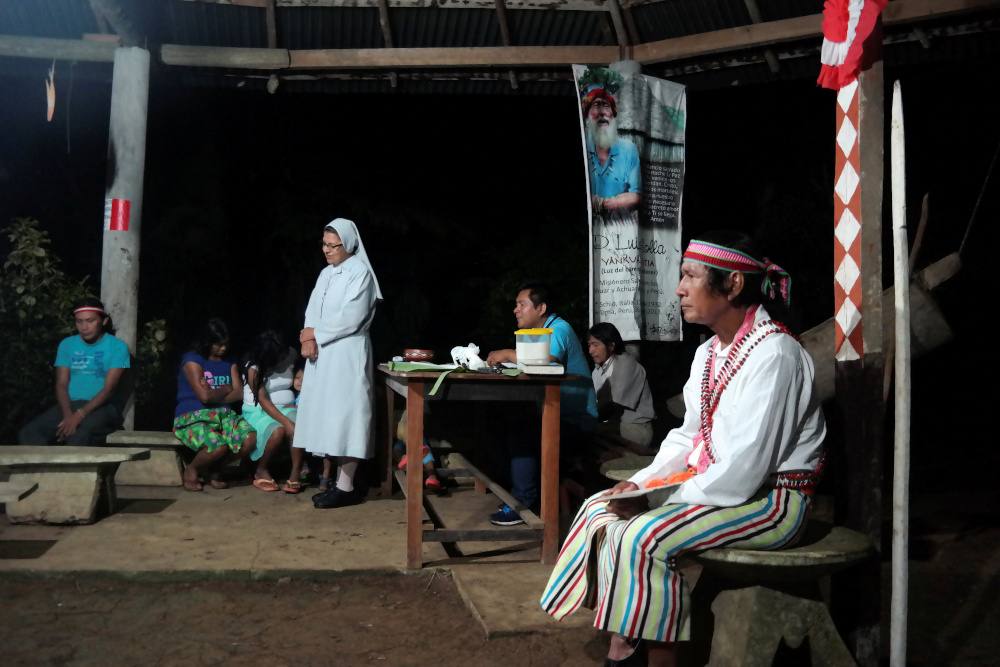
Deacon Shainkiam Yampik Wananch leads a liturgy with indigenous Achuar people at a chapel in Wijint, a village in the Peruvian Amazon, Aug. 20, 2019. (CNS/Reuters/Maria Cervantes)
Respecting indigenous traditions
The pope opens the fourth chapter of the exhortation with a long reflection on how the church can better inculturate itself in the Amazon region, stressing overall a need for respect and acceptance of traditions practiced by indigenous peoples.
Citing his 2013 exhortation Evangelii Gaudium, the pontiff writes: "While working for them and with them, we are called 'to be their friends, to listen to them, to speak for them and to embrace the mysterious wisdom which God wishes to share with us through them.'"
Francis also says that the church should "not be quick to describe as superstition or paganism" all traditional religious practices. "We ought to know how to distinguish the wheat growing alongside the tares," he says.
The pontiff appears to indirectly respond to one of the most dramatic scenes of the Amazon synod, when an Austrian traditionalist Catholic took wooden indigenous statues from a Rome-area church and threw them in the Tiber River.
"It is possible to take up an indigenous symbol in some way, without necessarily considering it as idolatry," writes Francis. "A myth charged with spiritual meaning can be used to advantage and not always considered a pagan error."
"A missionary of souls will try to discover the legitimate needs and concerns that seek an outlet in at times imperfect, partial or mistaken religious expressions, and will attempt to respond to them with an inculturated spirituality," he states.
[Joshua J. McElwee (jmcelwee@ncronline.org) is NCR Vatican correspondent. Follow him on Twitter: @joshjmac.]




